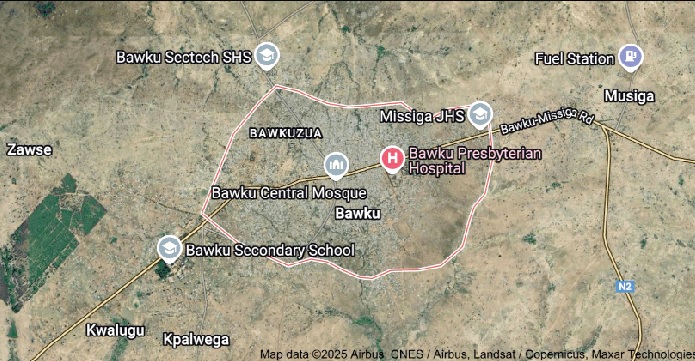The Chancellor of the University of Education Winneba (UEW), Neenyi Ghartey VII, has appealed to the government and other actors in the Bawku conflict to pursue efforts towards lasting peace with urgency.
He urged the government and relevant agencies to work to intensify efforts, including diplomatic, developmental and security-based strategies, to bring lasting peace to the area.
"This is not a Bawku issue.
This is a national responsibility.
Let us not treat this as a distant conflict, but as a national wound that requires our collective healing,” Neeyi Ghartey said in a passionate appeal.
At the second session of the 29th Congregation of the UEW last Saturday, Neenyi Ghartey called for urgency in efforts at resolving the conflict to restore peace to the area and accelerate its development.
Context
Neeyi Ghartey’s appeal comes in the wake of the uncertainty that has enveloped the area for years as the violent conflict continues to impact education, health care and other aspects of the economy.
The Ghana National Association of Teachers (GNAT) and the Pre-tertiary Teachers Association of Ghana, for instance, indicate the unstable situation in Bawku is taking a toll on education in the area.
The General Secretary of GNAT, Thomas Musah, said there were 2,070 members working in the enclave.
He said because of the situation, a local GNAT conference that should have been held in the area last month was suspended.
He added that a district conference slated for next month had also been put on hold.
The President of the Pre-tertiary Teachers Association of Ghana, King Awudu Ali, said for years now, academic work in Bawku had been seriously affected.
"Many teachers have sought transfer out of Bawku, and new teachers don't accept postings there either,” he said.
"At the end of the day, ordinary citizens, especially those in Bawku, don't benefit from the loss of lives and property,” he added.
Ruins must stop
Neenyi Ghartey, known in private life as Daniel Kobena Bortse Ghartey, said while Bawku was a land rich in culture, strength and resilience, and its people long been known for their industrious spirit, the conflict has had adverse effects on the community.
"Families are being torn apart, children cannot go to school, and livelihoods are crumbling under the weight of persistent violence. We cannot educate a nation while part of it burns.
We cannot and must not allow this to continue," he stated.
Neenyi Ghartey appealed to the people of Bawku to let peace prevail.
"Let peace reign. Let the guns go silent. Let peace be loud in Bawku. Let us silence the guns and raise the voices of reason, unity and brotherhood.
“Let us remember that conflict only brings suffering, loss and destruction, not only to lives and property but to the future dreams of our young ones," he stressed.
He particularly advised the youth of Bawku and its environs not to allow themselves to be used as agents of destruction, and urged them to rise as agents of peace and development.
He also urged the elders and opinion leaders of the area to use their voices to build bridges and not walls.
He said while the congregation ceremony was joyous, one could not gloss over the pain and uncertainty that faced the people of Bawku in its current volatile state.
Neenyi Ghartey, who is also the Paramount Chief of the Effutu Traditional Area, said Bawku and Ghana needed peace to drive national cohesion and development, and advised all, including academics and policymakers, to advocate peace everywhere in the country, saying "peace is not weakness; peace is strength, dignity and vision".
He added that a peaceful Ghana was the foundation on which a prosperous Ghana could be built.
"Every Ghanaian child deserves to grow up in peace whether in Accra or Bawku, Winneba or Navrongo, in Elubo or Sunyani. May peace return to Bawku, may healing find its way into every home, and may Ghana rise united, strong and full of promise for all her children," the traditional leader added.
Statistics
At the graduation ceremony, 6,969 students, made up of 2,969 males and 4,000 females, received degrees and diplomas.
They included 503 postgraduates, 38 doctoral degrees, 5,958 first degree holders and 308 diplomates.
The first degree holders — including 3,620 females — comprised 220 who had first class, 1,427 second class upper division, and 2,188 second class lower division.
Touching on educational development, Neenyi Ghartey commended President John Mahama for his dedication to promote inclusive education and his vision for sustainable and equitable education, saying it resonated with the university’s goal of maximising the potential of every student.
He urged the graduates to pursue excellence and hard work, and make a difference in all areas they found themselves, saying the university was confident they would excel with the knowledge and skills they had acquired.
The Vice-Chancellor of UEW, Professor Stephen Jobson Mitchual, thanked the government for policies that promoted access and equity, digital transformation and capacity-building, saying such efforts had helped institutions, including UEW, to produce adequately equipped graduates.
Prof. Mitchual further indicated that the university had improved investment in digital accessibility and ensured internet connectivity, which had enhanced efficiency in teaching, learning and examinations.

